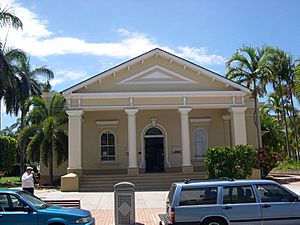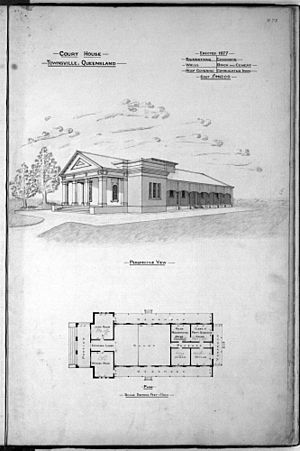Townsville Magistrates Court facts for kids
Quick facts for kids Townsville Magistrates Court |
|
|---|---|

Townsville Magistrates Court, 2003
|
|
| Location | 81 Sturt Street, Townsville CBD, City of Townsville, Queensland, Australia |
| Design period | 1870s–1890s (late 19th century) |
| Built | 1874–1901 |
| Architect | Francis Drummond Greville Stanley |
| Architectural style(s) | Classicism |
| Official name: Townsville Magistrates Court (former), Townsville Court House, Townsville Museum | |
| Type | state heritage (built) |
| Designated | 21 October 1992 |
| Reference no. | 600929 |
| Significant period | 1870s–1880s (historical) 1874–1910s (fabric) 1874–ongoing (social) |
| Significant components | court house |
| Builders | J & J Rooney |
| Lua error in Module:Location_map at line 420: attempt to index field 'wikibase' (a nil value). | |
The Townsville Magistrates Court is a special old building in Townsville CBD, Queensland, Australia. It used to be a courthouse where legal cases were heard. Today, it is used as a theatre.
This building was designed by a famous architect named Francis Drummond Greville Stanley. It was built between 1874 and 1876 by a company called J & J Rooney. People also know it as the Townsville Court House or the Townsville Museum. It was added to the Queensland Heritage Register on October 21, 1992, which means it's protected because of its historical importance.
A Look Back: The Building's History
This brick building was built from 1874 to 1876. It was the second Magistrates Court in Townsville. The famous colonial architect FDG Stanley designed it. Local builders J & J Rooney constructed it for about £4,463.
It was only the second brick building ever built in Townsville. It took two years to finish because there wasn't enough good clay to make bricks.
The Townsville Magistrates Court was a very busy place. It held different types of court sessions:
- The Northern Division of the Supreme Court met there twice a year.
- The Northern District Court also met twice a year.
- The Police Court met every day.
- The Petty Debts Court met twice a week.
These last two courts were led by the Police Magistrate. The building also had a lockup (a small jail) and living quarters for the lockup keeper.
The court house was repaired and painted in April 1895. A verandah was added to the western side in 1897. In 1901, a strong room was built at the back by James Brady.
This building served as a court house for almost 100 years. When new court facilities were built, the old building was almost torn down. But the local community worked hard to save it. The Townsville City Council bought it in the early 1970s.
After being restored, the building had several new uses. It was a day care facility for a while. Then it became a tourist information centre. In 1985, it opened as the Townsville Museum. The museum moved out in November 2003. Since 2016, the Full Throttle Theatre Company has used the building for performances.
What Does It Look Like?
This building has one floor and is made of two main parts. The front section is made of brick with a smooth finish, and the back part is made of timber.
The front of the building, facing Sturt Street, looks very balanced. It used to be the magistrate's office. It has a classical portico, which is like a grand entrance with a roof supported by columns. You reach it by a short set of stairs. The portico has a triangular top part called a gabled pediment. It also features round arched doors and windows. This part of the building looks strong and lasting.
The timber back of the building is different. It has wide verandahs and decorative timber details. This design is much better suited for the warm, tropical weather of Townsville.
A section at the very back of the building has been enclosed with glass louvres. The strong room, built in 1901, is still there.
The main roof of the building is hipped and covered with corrugated iron. A smaller, sloping roof covers the original strong room at the back.
A modern garden with green lawn and shady trees makes the building look even nicer. Even though the inside of the building has changed over time, its original outside look, or facade, is still there.
Why Is It Special?
The former Townsville Magistrates Court is listed on the Queensland Heritage Register. This means it's considered very important and is protected. It was added to the list on October 21, 1992, for several reasons:
- It shows how Queensland's history developed.
The Magistrates Court, finished in 1876, is important because it shows how Townsville grew into a key government centre in northern Queensland. It also shows that brick was used early on for buildings in Townsville.
- It shows what important buildings looked like.
The building's grand classical design shows what a significant judicial (court) building looked like back then. It highlights its important role in the community.
- It is beautiful to look at.
The Magistrates Court is a beautiful 19th-century building. It looks great even in a modern city and adds a lot to Townsville's historical look.
- It has a special connection with the community.
Local people really value this building as an important part of their history. This was clear when the Townsville City Council bought it in the 1970s to save it.
- It is linked to important people and groups in Queensland's history.
It's a great example of the work of colonial architect FDG Stanley. It also shows the early work of J & J Rooney, an important building company from North Queensland.


